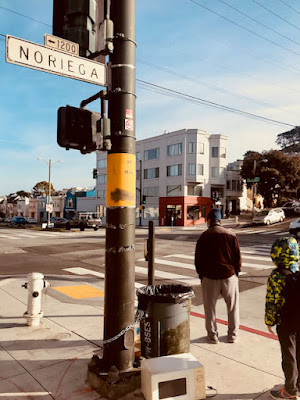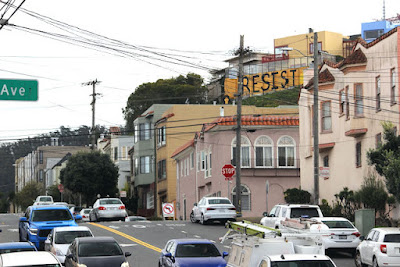I wrote a post about the protests against the Supreme Court decision on abortion. In it, I mentioned how, during the Vietnam war era, everyone was affected by the draft; men who were subject to the draft and the women who were connected to them. And that led to a lot more anti-war activism than any war since the draft was ended. I said I thought the abortion decision would have the same effect on activism now.
I got this comment:
I thought that 'privileged class' seemed like a pretty broad brush to paint all college students and explained in a follow up comment that while I acknowledged that as a white US citizen I clearly had privilege over people of color, but not over other white men subject to the draft. I explained my family background - that my parents had gotten to the US with very little and both worked full time. I also acknowledged that you might say I was privileged to live in California in the 60s when college was readily available to most anyone who really wanted to go and that it was cheap. Cheap enough for me to pay my room and board by working 15 hours a week. I asked what it was that privileged me that Anon didn't have.
His short answer was:
"Your privilege was not being 1-A like people who could not get a deferment."
I asked for his definition of privilege and what I had that let me get into college that he didn't have, given that his friends went to college. His response:
I wrote one more response trying to get him to clarify what class advantage I had that he didn't have. When I finished, and hit 'publish' Blogger comments said it was too long.
So I'm creating a whole new post. I think the concept of privilege is important to think about in the US. White Privilege was first outlined, to my understanding, by Peggy McIntosh, as a way of showing the differences that disadvantage black US citizens. Again, if you want to see the original post and the complete comments, go to this link. There are, of course, other forms of more exclusive privilege - particularly great family wealth, fame, etc.
But in recent years people have been throwing the term around pretty loosely - basically to mean, you have something I don't have. It's a Right Wing slur to go along with "elite," to attack people who believe in education and science as important pillars of democracy and civilization.
I'd also note that I suspect the commenter is someone who has commented many times before under the name of Oliver. The writing style, the tendency to not respond to the specific points I raise, the seeming resentment of higher education suggest that. I suspect Anon really believes there is something privileged about going to college, but I'm not sure why and he doesn't seem to want or be able to explain it.
I'd also note, in previous exchanges (not based on this recent post) I've noted that I believe that academic education is probably not the best choice for all, that technical and other kinds of training should be available to lead everyone to gainful, respectable employment. But that such training should include ethics and civic duties of all US citizens. I would add now that given our economy no longer seems to require everyone to work, we need to accommodate how we allow those who are put out of work due to automation and artificial intelligence to still live respectable and decent lives. One option that has been proposed is Universal Basic Income. The field of economics needs badly to rethink how a post - modern economy can and should think about and work including the moral judgments attached to it. .
The Comment That Was Too Long So It Ends Up With Its Own Post
Since you aren’t going to explain your definition of privilege, let me try to explain what I think it is and why I think it’s not the right word here.
From Dictionary.com: "1. a special advantage or immunity or benefit not enjoyed by all
2. a right reserved exclusively by a particular person or group (especially a hereditary or official right)"
It also says:
“Privilege comes from Latin privilegium, meaning a law for just one person, and means a benefit enjoyed by an individual or group beyond what's available to others.”
My question to you was: What special group did I belong to that allowed me to get a deferment that you didn’t belong to? OK, I know you are going to say 'you were a college student." But what privilege did I have that got me into college that you didn't have?
You haven’t answered that question. I’ve already said that I was ‘privileged’ to live in California in the 1960s when higher education was readily accessible to most anyone at a very low cost to anyone who chose to pursue it.
I’ve acknowledged that I was privileged over people of color who had far greater obstacles than white folks to get into good public schools and into colleges.
I’ve pointed out that my parents arrived in the US with almost nothing and both worked full time all the time I was going to school and beyond. So I didn't have any special wealth or connections.
You now say that getting a deferment for being in college was a privilege that a full time sewing machine factory worker didn’t have. Is this a hypothetical factory worker? Since you said you were drafted right after high school, I assume this factory worker wasn’t you.
And if someone was working full time in a factory to support a family, and thus couldn't go to college, there’s a good chance he was a father or had some other good reason to qualify for a hardship deferment. And, in fact, there were more hardship deferments than college deferments as I mentioned in the first response to you.
Do you feel people missing a finger or with bad eyesight or some other physical disqualification that kept them out of the military were privileged too?
Were females privileged, because they didn’t even have to register for the draft? Those who wanted to serve in the military, like some women, might say your hypothetical factory worker was privileged because he could serve but they couldn't.
So, I’m asking again, what was it that you lacked, that I had, that allowed me to go to college but not you?
You said your classmates went to college. Why didn’t you? From these comments and previous ones (if this is indeed Oliver commenting), it appears you have some resentment toward people who go to college and I’m trying to understand it. Do you think college is a bad thing? Do you think studying English Literature is frivolous? If so,
read my post about the college class I learned the most valuable lessons in. Would it have been better in your mind if I had been studying engineering or business?
Are you saying that Congress was wrong to allow college students deferments until they graduated? You may be right on that point, and the lottery, as you pointed out, changed that. But Congress did allow college deferments, so if a deferment was what people wanted, they knew what paths to take. (That wasn't why I went to college, but it was a benefit I wasn't going to scoff at.)
I wasn’t part of any wealthy elite. I am white and that gave me privilege over people who weren’t. I didn’t come from a family with a long tradition of serving in the military who had expectations I would join the military, like many had. Is that the privilege here? Other than being white, I didn’t belong to any special class of people that gave me an advantage over the sons of other people who had to work full time to achieve their version of the American Dream. In those days factory jobs paid better than many other kinds of jobs and had retirement benefits and health care.
Are you saying I was privileged because my parents didn’t beat me and they valued education rather than the military? (I didn't mention these things, but they do apply.) Well, yes, then I was privileged. But that's a pretty loose definition of privilege.
So tell me: what do you think I had that wasn’t available to you? And was that something I had based on some exclusive group I belonged to that was closed off to others? Some sort of birthright that gave me an advantage that other white working class US kids didn't have?

















